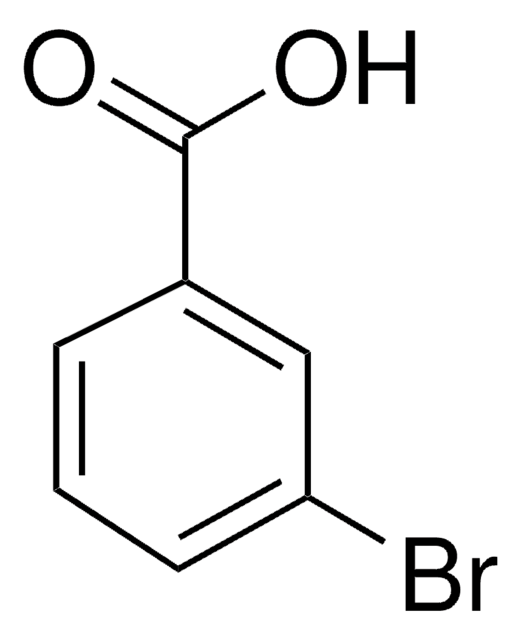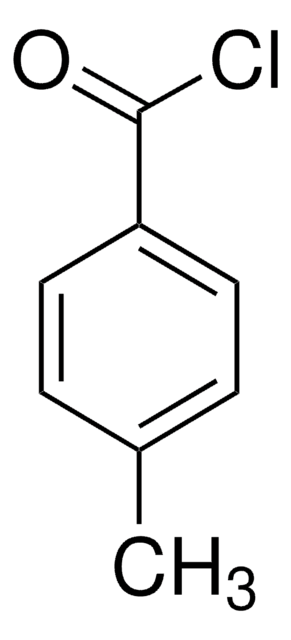T36803
p-Toluic acid
98%
Synonym(s):
4-Methylbenzoic acid
Sign Into View Organizational & Contract Pricing
All Photos(1)
About This Item
Linear Formula:
CH3C6H4CO2H
CAS Number:
Molecular Weight:
136.15
Beilstein:
507600
EC Number:
MDL number:
UNSPSC Code:
12352100
PubChem Substance ID:
NACRES:
NA.22
Recommended Products
Assay
98%
bp
274-275 °C (lit.)
mp
177-180 °C (lit.)
SMILES string
Cc1ccc(cc1)C(O)=O
InChI
1S/C8H8O2/c1-6-2-4-7(5-3-6)8(9)10/h2-5H,1H3,(H,9,10)
InChI key
LPNBBFKOUUSUDB-UHFFFAOYSA-N
Looking for similar products? Visit Product Comparison Guide
Related Categories
Application
- One-Pot Synthesis of 1,3-Cyclohexadienes by Birch Reduction in the Presence of Carbonyl Compounds.: This paper presents a novel synthetic approach involving p-Toluic acid, useful for chemists and researchers in synthetic chemistry aiming to develop more efficient synthesis routes (Linker et al., 2024).
Signal Word
Warning
Hazard Statements
Precautionary Statements
Hazard Classifications
Skin Sens. 1
Storage Class Code
11 - Combustible Solids
WGK
WGK 1
Flash Point(F)
357.8 °F
Flash Point(C)
181 °C
Personal Protective Equipment
dust mask type N95 (US), Eyeshields, Gloves
Certificates of Analysis (COA)
Search for Certificates of Analysis (COA) by entering the products Lot/Batch Number. Lot and Batch Numbers can be found on a product’s label following the words ‘Lot’ or ‘Batch’.
Already Own This Product?
Find documentation for the products that you have recently purchased in the Document Library.
Customers Also Viewed
C E Kuo et al.
Chemosphere, 45(6-7), 835-842 (2001-11-07)
The composition of the headspace gas affected the growth dynamics of microbial populations and the biotransformation pattern of p-toluic acid in anoxic estuarine sediments. Under CO2 atmosphere, p-toluic acid was transformed by the sediment microorganisms without a lag period, while
Sven Lahme et al.
Applied and environmental microbiology, 78(5), 1606-1610 (2011-12-20)
A novel alphaproteobacterium isolated from freshwater sediments, strain pMbN1, degrades 4-methylbenzoate to CO(2) under nitrate-reducing conditions. While strain pMbN1 utilizes several benzoate derivatives and other polar aromatic compounds, it cannot degrade p-xylene or other hydrocarbons. Based on 16S rRNA gene
A C Franck-Mokross et al.
Applied microbiology and biotechnology, 50(2), 233-240 (1998-12-05)
Pseudomonas sp. D7-4 and Pseudomonas sp. B13 FR1(pFRC20P) degraded mixtures of chloro- and methyl-substituted benzoates exclusively via an extended ortho pathway, whereas in Pseudomonas putida WR 201 both ortho and meta fission were induced by mixtures of 3-chloro- and 3-methylbenzoate
Sven Lahme et al.
Environmental microbiology, 14(5), 1118-1132 (2012-01-24)
The pathway for anaerobic degradation of 4-methylbenzoate was studied in the denitrifying alphaproteobacterium Magnetospirillum sp. strain pMbN1. Adaptation studies with whole cells indicated substrate-dependent induction of the capacity to degrade 4-methylbenzoate. Differential protein profiling (2D-DIGE) of 4-methylbenzoate- in comparison with
F Junker et al.
Microbiology (Reading, England), 142 ( Pt 9), 2419-2427 (1996-09-01)
Three multicomponent oxygenases involved in the degradation of p-toluenesulfonate and p-toluenecarboxylate and the regulation of their synthesis have been examined in three strains (T-2, PSB-4 and TER-1) of Comamonas testosteroni. Strain T-2 utilizes p-toluenesulfonate as a source of carbon and
Our team of scientists has experience in all areas of research including Life Science, Material Science, Chemical Synthesis, Chromatography, Analytical and many others.
Contact Technical Service














